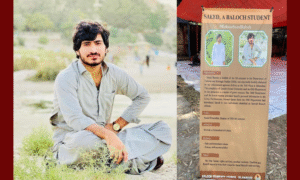Usama Malick
A pandemic is commonly defined as the worldwide spread of a novel disease. If we look in the hindsight, we will get to have a number of accounts of gory pandemics that ravaged the human lives beyond the ken of many an intellect such as ‘Black Death’—that reportedly wiped out over half of Europe’s population — and ‘Spanish Flu’—which nigh 500 million people fell victim to and the morbidity rate was also very alarming. Besides these, history has been a witness to many other pandemics including ‘Asian Flu’ and ‘AIDS’. Asian Flu claimed more than one million lives across the globe and Aids claimed nearly 35 million lives ever since it was first identified.
For the time being, the whole humanity is yet again confronted with a novel multi-pronged death-dealing virus namely Covid-19 aka (also known as) Coronavirus. Its origin of emergence is said to have been the seafood and live animal market in Wuhan city of China’s province Hubei, where the first person, reportedly, got infected with this virus from an animal. According to Professor Stephen Turner of Melbourne’s Monash University, “viruses of this kind are circulating all the time in the animal kingdom”. This revelation lends credence to the fact that virus would have surely been transferred from an animal. Furthermore, the majority of the virologists have also pointed out the mammal Pangolin through which the virus is said to have been transmitted into the human body. Although, the cases of covid-19 had begun to surge during the month of December of late last year 2019, yet the World Health Organization (WHO) played down the threat posed by this virus that ultimately led to the worsening of the situation. Going by the deteriorating situation in China and in order to save their lives, the indigenous people found it better to flee to different countries. Some of the travellers would have certainly carried the virus to the host countries that gradually became the reason of this contagion’s spread like a wildfire across the globe. In the following months of June and July 2020, world witnessed an exponential increase in the covid-19 infected cases with over two million cases and 100 thousand confirmed deaths in the United States alone. Pakistan has still been fortunate enough with 226 thousand cases and a little over 4700 deaths reported so far. Only the countries that imposed early curbs on travelling and closed down their borders for foreigners have been successful in tackling this virus. The most appropriate example in point is that of New Zealand whose Premier Jacinda Ardern celebrated zero new covid-19 case in her country a few days ago. Actions taken timely have, undoubtedly, helped countries a great deal to overcome the damage caused by this virus and return to a normal situation.
Given the story published in the ‘Time’ magazine under the rubric of “Warning: the world is not ready for another pandemic” by Bryan Walsh in 2017 and a myriad of other predictions by the virologists, this novel pandemic was bound to afflict the humanity. The report of World Wide Fund for Nature (WWF) organization unequivocally says 60-70 percent of the new diseases that have emerged in humans since 1990 came from wildlife. The report goes on to point out that the menace of new Wildlife-to-human diseases will be many folds higher in the years to come. Notwithstanding all these frequent warnings by the renowned nature experts, world citizens didn’t seem to have learnt any lesson during the last 30 years and owing to their such immature attitude, humankind continued to suffer from various ilks of pandemics like Sars, Ebola virus, Aids and zika virus, which all were originated from animal populations. The most recent paradigm that manifests our terrific unbalanced relationship with the nature is the unfolding of Coronavirus. Deforestation on a mammoth scale has also contributed a lot to the emergence of such diseases. Some reports say that there has been clearing of 178 million hectares of forest from different parts of the world in the last 30 years which, much to our surprise, is equivalent to more than seven times the area of UK. A recent study found out that ten percent increase in deforestation, would raise the malaria cases by 3.3 percent. As a result, in order to stave off ill-natured happenings in the years to come, we must rethink our priorities and develop true love for nature by determining to plant saplings once in a year in lieu of deforesting the existing green swathes of land present on this planet.
In the wake of Coronavirus, social distancing has become a new normal. Using the technology, a new system got developed known as ‘Telemedicine’ in the developing countries to provide medical aid by connecting the doctors with the patients hailng from remote townlets or villages where proper medical amenities were very limited. If we talk about the sphere of education, in less than three months, around 1.5 billion students and 65 million teachers found themselves out of class rooms in almost 180 countries. To avoid the educational loss of students, majority of the countries went for e-learning by making use of different applications such as Zoom, Google Meet and Google Classroom. Making the most of the technology, world has now also come up with fantabulous covid-19 testing kits which give results within 5 minutes with 95 percent accuracy guaranteed. Never before this pandemic, had all the countries of the world felt the dire importance of advancement in the field of technology in which they had been lagging behind for years. We can hope that once this pandemic runs its course, governments will collaborate with the technological institutions to equip them with the contemporary machineries and other required gear.
During the course of this pandemic, South Asian countries have found themselves in the vortex of adverse effects with tourism coming to a halt, demand for garments collapsed and most importantly the supply chains have seen the worst kind of disruptions. High scale layoffs in these unprecedented times have also left countless people floundering. Therefore, it was rightly foretold by World Bank that the destitute would be more affected by the crisis. Apart from fiscal woes, this pandemic has also exacted its toll on mental health by affecting people from every age group with unfathomable depression alike.
Succinctly, this virus has left the world bewildered and in quest of a vaccine that may halt the further loss of lives and help bring tens of thousands of masses back to their hearthstones from hospitals or quarantined centers where they will be battling the virus and crying for life after being tested positive for it. The nukes designed to and having the capability to exterminate millions of masses in a very brief period of time are also at a loss to annihilate this microscopic enemy. Therefore, learning from the vicious past experiences, if the developed nations had shifted their attention and adequate resources to the medical advancement—especially to virology—rather than buying up-to-date ammunitions, we would have been in a far better position to defeat this virus. But at the moment, the virus rages on and the future is still shrouded in uncertainty.
The writer can be reached on Twitter: @UsamaMalick10
The Students’ Herald News Desk focuses on reporting the latest news regarding student politics and campus updates to you.
The News Desk can be reached at admin@thestudentsherald.com




